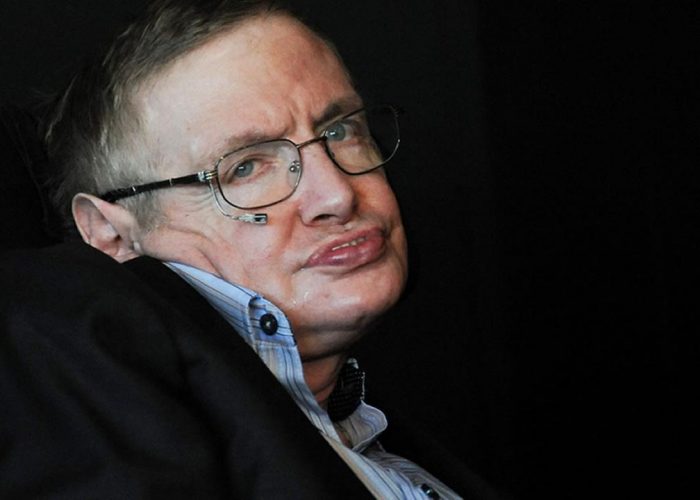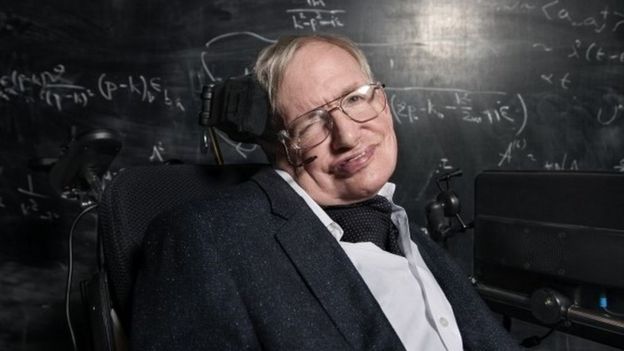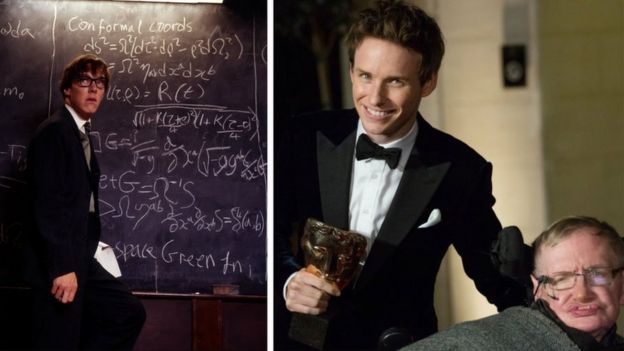



Stephen Hawking has died
WOLRD renowned physicist Stephen Hawking has died at the age of 76.
He died peacefully at his home in Cambridge in the early hours of Wednesday, his family said.
The British scientist was famed for his work with black holes and relativity, and wrote several popular science books including A Brief History of Time.
At the age of 22 Prof Hawking was given only a few years to live after being diagnosed with a rare form of motor neurone disease.
The illness left him in a wheelchair and largely unable to speak except through a voice synthesiser.
 Pic by RICHARD ANSETT
Pic by RICHARD ANSETT
In a statement his children, Lucy, Robert and Tim, said: “We are deeply saddened that our beloved father passed away today.
“He was a great scientist and an extraordinary man whose work and legacy will live on for many years.”
They praised his “courage and persistence” and said his “brilliance and humour” inspired people across the world.
“He once said, ‘It would not be much of a universe if it wasn’t home to the people you love.’ We will miss him forever.”
A book of condolence is due to be opened at Gonville and Caius College in Cambridge, where Prof Hawking was a fellow.
 Stephen Hawking was portrayed on TV and film by Benedict Cumberbatch and Eddie Redmayne
Stephen Hawking was portrayed on TV and film by Benedict Cumberbatch and Eddie Redmayne
Prof Hawking was the first to set out a theory of cosmology as a union of relativity and quantum mechanics.
He also discovered that black holes leak energy and fade to nothing – a phenomenon that would later become known as Hawking radiation.
Through his work with mathematician Sir Roger Penrose he demonstrated that Einstein’s General Theory of Relativity implies space and time would have a beginning in the Big Bang and an end in black holes.
The scientist gained popularity outside the academic world and appeared in several TV shows including The Simpsons, Red Dwarf and The Big Bang Theory.
He was portrayed in both TV and film – recently by Oscar winner Eddie Redmayne in The Theory of Everything, which charted his rise to fame and relationship with his first wife, Jane.
The actor paid tribute to him, saying: “We have lost a truly beautiful mind, an astonishing scientist and the funniest man I have ever had the pleasure to meet.
“My love and thoughts are with his extraordinary family.”
Tim Berners-Lee, inventor of the web, was one of the first people to pay tribute to Prof Hawking.
“We have lost a colossal mind and a wonderful spirit. Rest in peace, Stephen Hawking,” he said.
The vice chancellor of the University of Cambridge – where Prof Hawking had studied and worked – Professor Stephen Toope, said he was a “unique individual” who would be remembered with “warmth and affection”.
He added: “His exceptional contributions to scientific knowledge and the popularisation of science and mathematics have left an indelible legacy. His character was an inspiration to millions.”
Prof James Hartle, who worked with him to create the Hartle-Hawking wavefunction to explain the Big Bang, said Prof Hawking had a “unique” ability to “see through all the clutter in physics” and get to the point.
He told BBC Radio Four’s Today programme: “My memory of him would be… first our work together as scientists and, second, as a human being whose whole story is a triumph over adversity [and] who inspired a lot of people, including me.”
American astrophysicist Prof George Smoot, who knew and worked with Prof Hawking, described him as “very competitive”.
He told Today: “Whenever I did something, he wanted to do it better.
“The one thing he was jealous of was I got the Nobel Prize before he did.”
Prof Lord Martin Rees, the Astronomer Royal, who was at university with Prof Hawking when he was diagnosed, said his friend had “amazing willpower and determination”.
“Even mere survival would have been a medical marvel, but of course he didn’t just survive,” he said. “He became one of the most famous scientists in the world.“![]()
Prof Brian Cox, science presenter and professor of physics at the University of Manchester, described him as “one of the greats”.
“There are physicists that in 1,000 years’ time they will still be talking about Hawking radiation, they will be using his fundamental results on black holes.
“There are at least three areas where his work will be remembered as long as there are cosmologists and that is the best you can hope for as a scientist.”
The comedian and presenter of the BBC’s Stargazing Live Dara O’Briain said the scientist had an “immeasurable life” and “one of the few people I would call a hero of mine”.
He added: “His work elevated us to the extra-ordinary; his life pushed down a terrible, limiting disease so that he could enjoy the full joy of the ordinary. In both, he was a triumph of what we, as humans, can achieve.”
British astronaut Tim Peake said Prof Hawking “inspired generations to look beyond our own blue planet and expand our understanding of the universe”.
He added: “His personality and genius will be sorely missed. My thoughts are with his family.”
Defence Minister Tobias Ellwood said Prof Hawking was “an inspiration to us all, whatever our station in life, to reach for the stars”.
He tweeted: “RIP Sir. You epitomised true courage over adversity as you explained the wonders of the universe to the world. Your achievements symbolise the pwr (sic) of the human mind.”
Local government minister Sajid Javid said: “One of most inspirational people throughout my life. A brief history on earth, an eternity in the stars.”
Labour’s Chuka Umunna tweeted: “What a wonderful and extraordinary man. A huge loss for the world, not just our country. Thinking of his family today.”
Apple’s co-founder Steve Wozniak said: “Stephen Hawking’s integrity and scientific dedication placed him above pure brilliance,”
Satya Nadella, Microsoft chief executive, said: “We lost a great one today. Stephen Hawking will be remembered for his incredible contributions to science – making complex theories and concepts more accessible to the masses.
“He’ll also be remembered for his spirit and unbounded pursuit to gain a complete understanding of the universe, despite the obstacles he faced.”
In his 2013 memoir he described how he felt when first diagnosed with motor neurone disease.
“I felt it was very unfair – why should this happen to me,” he wrote.
“At the time, I thought my life was over and that I would never realise the potential I felt I had. But now, 50 years later, I can be quietly satisfied with my life.”
Speaking to the BBC in 2002, his mother, Isobelle, described him as a “very normal young man”.
She said: “He liked parties. He liked pretty girls – only pretty ones. He liked adventure and he did, to some extent, like work.” – bbc.com